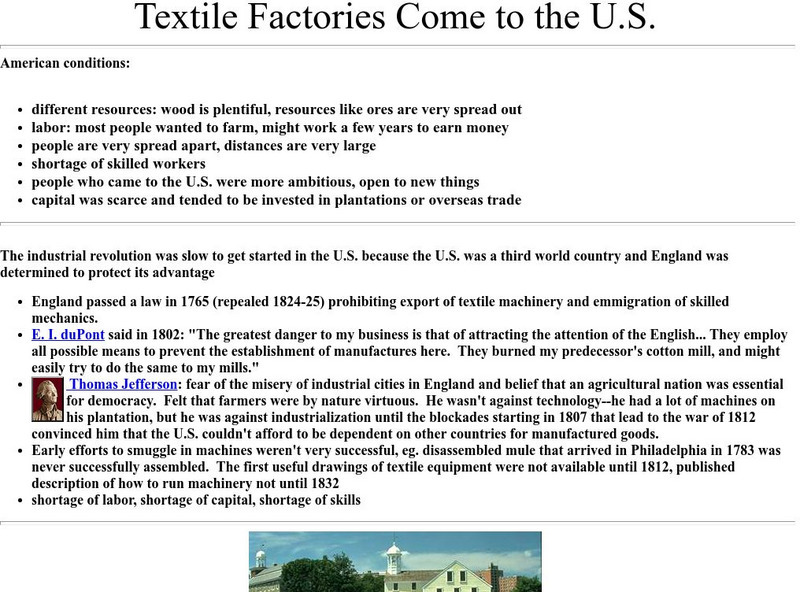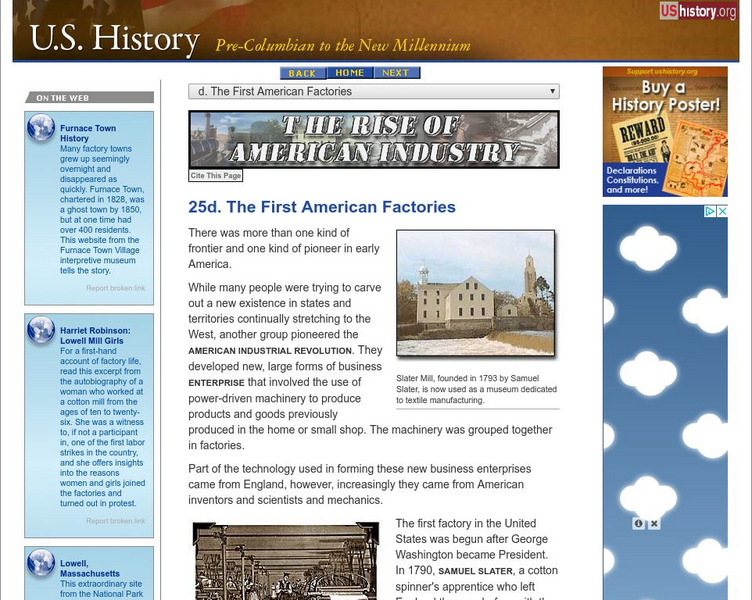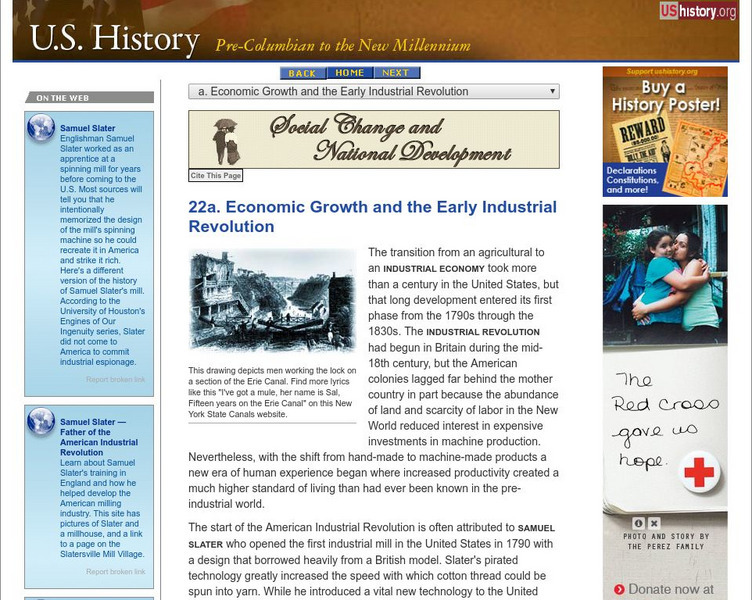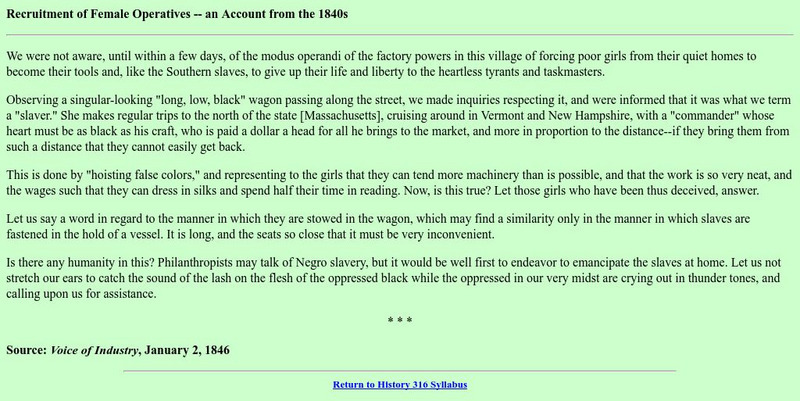Curated OER
To Strike or Not to Strike in 1830s Lowell: A Role Play
Role play as a person living in the 1830s working in a Lowell factory. The class will take on the role of factory owner, girl on strike, talk show host, and girl not wanting to strike. Each group will analyze and research their character...
Curated OER
Industrialization In Lowell, Massachusetts
Students explore the idealistic expectations of the industrialists who financed and built mills in Lowell, Massachusetts. They research how the expectations of Lowell mill founders compared to the reality of life in the textile mills for...
Curated OER
Lowell and the Factory System
Students examine the efforts of early American manufacturers to implement the factory system on a large-scale in the town of Lowell, Massachusetts. They examine the idealistic goals of the industrialists who financed and built the...
Curated OER
Early 19c Industrialization in America: The Market Revolution
Posing a question about the effects of American Industrialization, this presentation provides viewers with a comprehensive look at the 19th century. From the "Lowell Girls" to the Iron Horse, these slides would be an excellent supplement...
Curated OER
Industrialization Spreads: From Britain to the World
Looking for that perfect slide show, the one that makes your day so much easier? If you're teaching a unit on the spread of Industrialization, its causes, effects, and key players, then look no further. This is a text-driven presentation...
Curated OER
Lesson 11: Lowell Workers and Producers Respond to Incentives
Students explore concept of supply and demand and how changes in supply affect price and quantity of goods.
Curated OER
The Industrial Revolution and Women
Middle schoolers learn about inventions of the Industrial Revolution and their impact on life. In this Industrial Revolution lesson, students look at how the Industrial Revolution changed the work experience from farms to factories. They...
American Museum of Natural History
Paleontology Books
A list of 11 books about paleontology offers titles, authors, and a brief description of the tale.
Curated OER
Lyddie
Students investigate the character trait of perseverance and how it is used to help a girl gain independence in a fictional story. The story also has them think about the value of relationships and then write reflectively about...
Curated OER
A Historical Career Search
Students analyze the use of language, including non-standard written and oral English. They write persuasive, descriptive, narrative and/or evaluative pieces in response to the story read and keep reflection journals. Finally, students...
Curated OER
A Revolutionary Idea!
Fifth graders explore the Industrial Revolution. They examine the early gristmills and sawmills. Students explain why they were necessary and helpful in the lives of early Americans.
Annenberg Foundation
Annenberg Learner: Primary Sources: The Lowell System
An hour-long professional development video on teaching how the Lowell System was a departure from traditional labor practices. Features experienced classroom teachers. Materials and a complete lesson plan are also provided.
Digital History
Digital History: The Introduction of the Factory System
The factory system revolutionized manufacturing and the employment of unskilled workers to man the factories. Read about the young children, women, and, later, immigrants who provided the labor to the textile mills and other...
Khan Academy
Khan Academy: Us History: 1800 1840: Women's Labor
From the Lowell factory workers to the feminized role of the American schoolteacher, women began to make professional strides during the first half of the 19th century.
History Tools
History Tools: Spirit of Discontent: Young Woman Reflects on Factory Work [Pdf]
Historical primary source story from the Lowell Offering, 1841, which offers reflections on the pros and cons of factory work, ultimately supporting the work and the growth of industry. With modernized spelling and added page numbers.
PBS
Who Made America?: Francis Cabot Lowell:consolidated Manufacturing
A brief biography of Francis Cabot Lowell which describes his role in the industrial revolution in the United States. Read about the factory system, the so-called Lowell girls, and mechanization of cloth manufacture.
Other
Lecture Notes: Textile Factories Come to the u.s.
Clemson University provides a historical overview of the wave of textile factories, including Slater and Lowell, that cropped up in the northeast. Hyperlinks to additional information.
Independence Hall Association
U.s. History: The First American Factories
The growth of cities and the American economy in the first half of the 19th century was driven by the growth of factories. Read about the textile industry in New England and how manufacturing spread throughout the north.
Internet History Sourcebooks Project
Fordham University: Modern History Sourcebook: "Lowell Mill Girls" by Harriet Robinson
Archived news article. A personal account of young female cotton mill workers in Massachusetts during the mid-1800's.
Independence Hall Association
U.s. History: Economic Growth and the Early Industrial Revolution
A very thorough look at the industrial growth in the North because of the advent of the Industrial Revolution in America. See what industries grew, how factories became more productive, and find out how the states cultivated economic...
Other
University at Albany: Recruitment of Female Operatives in the 1840's
Tells the story of Lowell Mill factory and the "capturing" of poor white females to "work" in the factories. From "Voice of Industry," January 2, 1846.
OpenStax
Open Stax: Transformation in North 1800 50: Early Industrialization Northeast
Examines the transformation of work from artisan-centered to a mechanized workforce. Looks at the emergence of industrialization and the impact it had on production and on the worker experience, the development of the consumer society,...










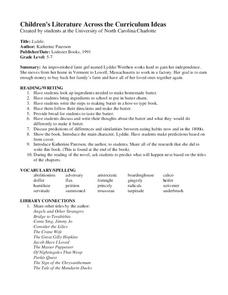
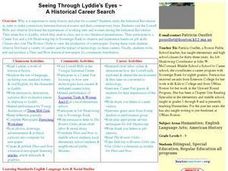


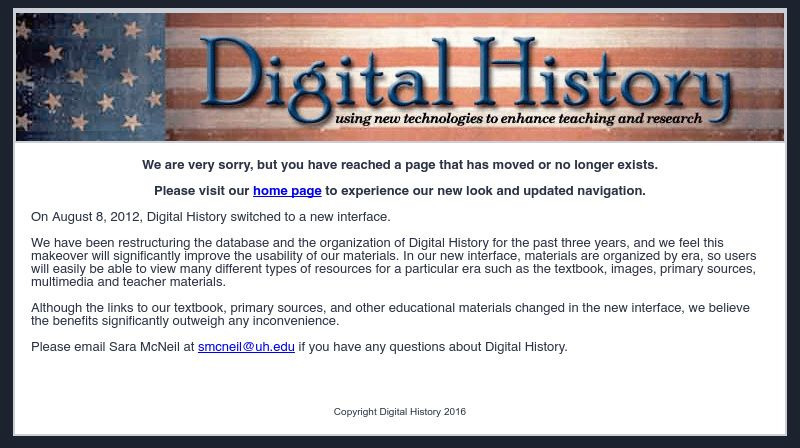

![History Tools: Spirit of Discontent: Young Woman Reflects on Factory Work [Pdf] Primary History Tools: Spirit of Discontent: Young Woman Reflects on Factory Work [Pdf] Primary](https://d15y2dacu3jp90.cloudfront.net/images/attachment_defaults/resource/large/FPO-knovation.png)

